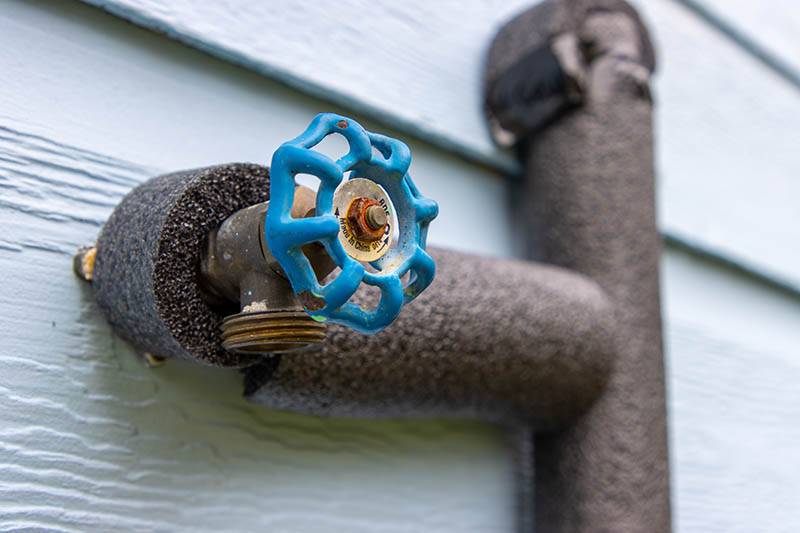
The Ultimate Guide for Freeze Prep
According to the National Weather Service, an Arctic cold front is forecast to move through the region later this weekend, followed by hard freezes through Tuesday night. Planning ahead is critical to protect yourself, your loves ones and your property in the event of power disruption, loss of communication services, and road closures.
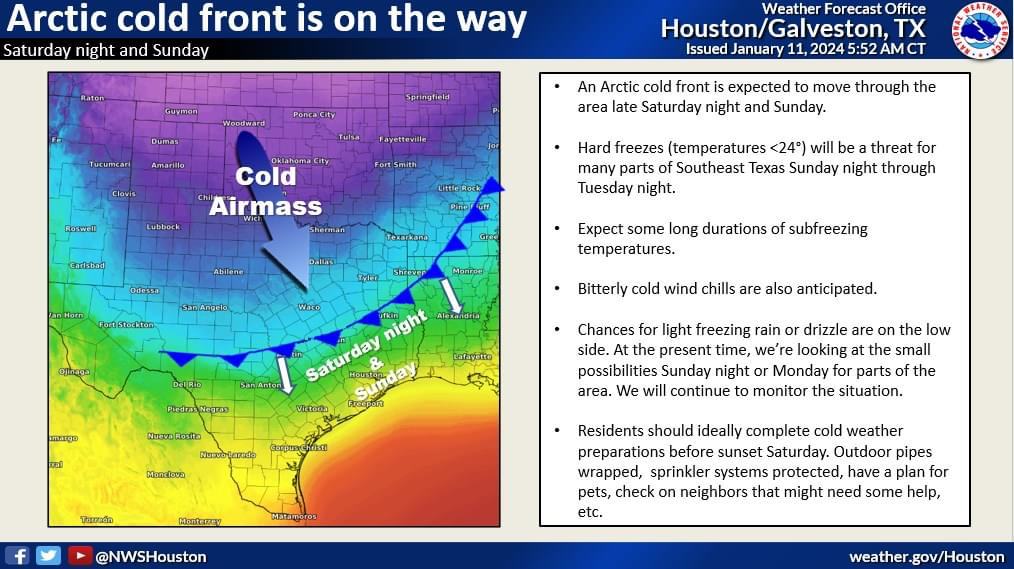
Vehicle Safety Tips
- Fully check and winterize your vehicle.
- Keep your gas tank full.
- Have tire pressure checked.
- Have a phone charger, flashlight, first aid kit, blankets, warm clothes, jumper cables, bottled water and non-perishable snacks in your car.
- Stay off roads, if possible. If you become trapped in your car, stay inside the vehicle.
- Check local road conditions at www.houstontranstar.org. State highway information available at www.drivetexas.org.
Remember the 4 P's: People, Pets, Pipes and Plants
-
Dress in warm clothing. Wear coats and gloves when outdoors.
- Protect children and the elderly. Never leave them in a cold place or vehicle.
- Consider each person’s specific needs, including medication.
- Gather supplies that can lasts through several days if there’s a power outage, including extra batteries for radios and flashlights, food and bottled water.
- Watch for signs of frostbite and hypothermia and learn how to treat the symptoms. View more from the CDC on this topic here.
- If you see individuals who appear to be experiencing homelessness outside during the freeze, contact the Harris County Sheriff's Office Homeless Outreach Team (HOT) via HCSO dispatch at 713-221-6000 so that they can assist with resources. To learn more about this program, click here and for more about program standards, click here.
-
Provide MORE: Food, Water and Shelter: Outdoor pets need to consume 25 to 50 percent more calories than usual because the cold weather tends to deplete their energy. Make sure to provide fresh water for your pet and use plastic food and water bowls as your pet's tongue can stick to metal or the water can freeze. Outdoor pets should have a shelter or dog house that will protect them from the wind and is elevated. Add in blankets, towels or hay to help keep your pet warm and dry.
-
Exercise Care with Cats, Canines and Cars: In the winter, the interior of an idle car can act as a refrigerator, so never leave pets in a car. Keep your cats indoors during cold weather as they may sleep under the hoods of cars to stay warm. Give an outdoor cat a chance to escape by banging loudly on the car hood before starting your car.
-
Equine & Farm Animals: Be sure horses have access to a barn or a three-sided structure with a roof so they can escape the wind and cold. While not all horses will need to be blanketed, blankets will help horses keep warm and dry, especially in the rain or freezing temperatures. Frequently check water troughs and buckets to ensure the water is not frozen. Provide access to extra grain and hay if no grazing is available. Feed your horse unlimited forage during extreme cold to help them increase and regulate their body temperatures.
-
Wildlife: Just like humans, wildlife seek refuge from the cold. Set out birdhouses or leave natural debris like fallen leaves and branches in your yard to create hiding spots for small animals. Set up bird feeders with high-energy seeds and suet. Also, keep bowls of fresh, unfrozen water out for birds and other critters. More tips on helping wildlife can be found here.
Pipes
- Prevent frozen pipes and damage to your home by opening the cabinets under the kitchen and bathroom sinks to allow warm air to circulate and warm the pipes.
- Let the faucets drip. Moving water freezes slower than still water.
- Insulate outdoor faucets and exposed pipes, including those tied to your home irrigation system, and be sure to disconnect and drain hoses from outdoor spigots.
- If your system has a drain valve, consider draining the system before the hard freeze, as standing water in the pipes can freeze and potentially lead to unwanted leaks.
- If you have a swimming pool, either drain the circulation system or keep the pump motor running.
- Run the pump motor only in a short freeze, as running the motor for long periods could damage it.
Plants (from the Harris County Master Gardeners)
- Frost Protection Options
- Water if soil is dry.
- Cover tops and sides of plants.
- Move under cover (eaves, trees, patio).
- Move near buildings with heat.
- Place bucket of water near plants
- Freeze Protection Options
- Cover plant and secure to the ground.
- Add source of (safe) heat under cover.
- Provide a windbreak.
- Bank citrus and other plants with soil.
- Mulch annual, perennial, and tender plants.
- Cover Partially
- Drape or tent the upper/side parts of plants to slow the plant's cooling. Sheets, blankets, boxes, or frost-blankets can be used.
- Chance of frost increases with cold, clear nights. Moving plants under tables, eaves, covered patios, or larger plants can provide protection needed to prevent frost.
- Frost can occur between 33-37° if dew point drops below 32°. Clear nights increase chances.
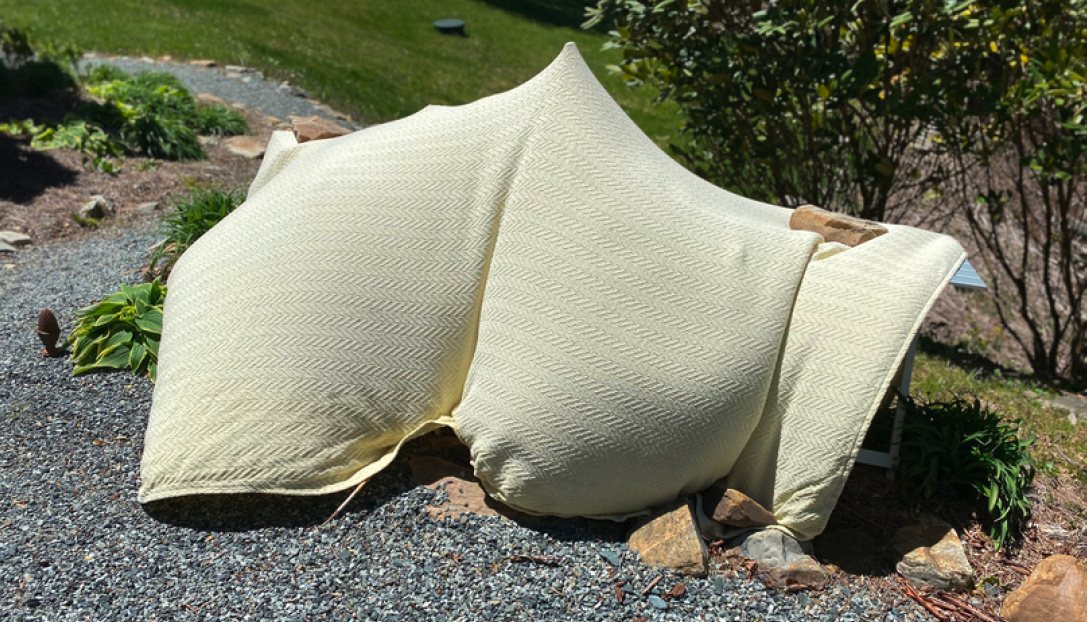
- Cover Fully and Heat
- Covering a plant's leaves alone during a freeze will not protect it. Heat needs to be captured and contained by securing the cover to the ground. This can be as simple as covering and forcing ground heat upward toward the plant or adding heat.
- Freeze occurs below 32° and a hard freeze at 28° for more than 4 hours. Wind increases threat.
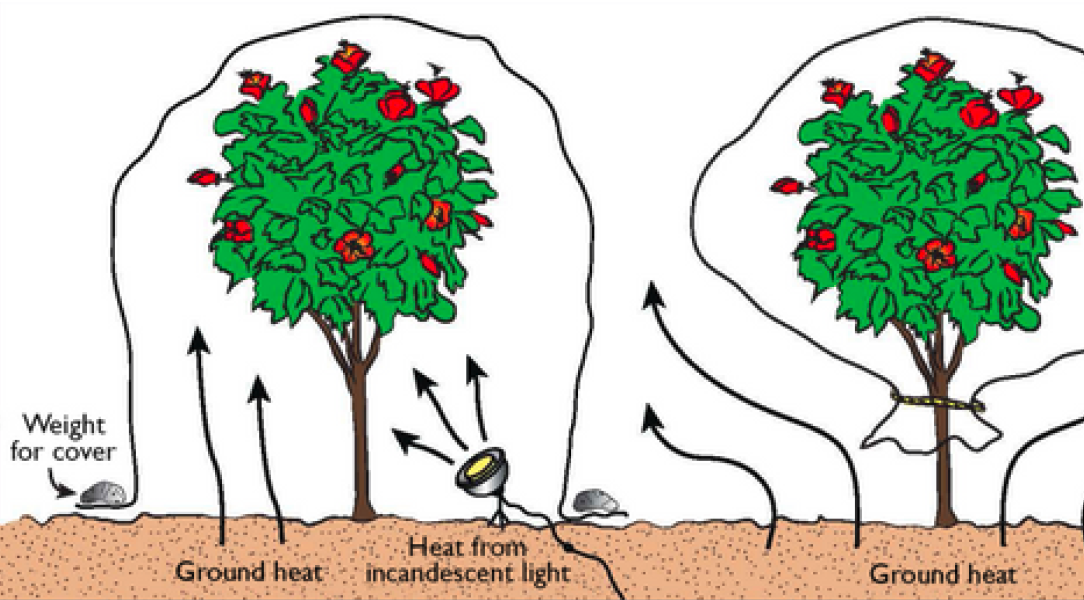
|
Q&A Why water plants before a frost? Dry soil stresses a plant, causing more damage during a freeze. Water also releases heat during cold periods or overnight. Can I use plastic to cover plants? Plastic should not be used alone as it can burn the parts of the plants in which it is touching. However, plastic can be used if then covered with a blanket, as the blanket helps slow radiant cooling. Remove during the day to avoid overheating. What type of lights can be used safely under coverings? You don't need to produce a lot of heat, just enough to raise it a couple degrees, depending on the temperature. Holiday string lights accomplish this well, primarily the larger bulbs. A clamp-on floodlight with a heat lamp bulb can also be used. |
|
Citrus Trees Sweet oranges tend to be more cold-hardy. Cover and add heat to small trees. |
Hardy Perennials Proper mulch will insulate the roots, but decide on what is worth the effort if covering. |
Winter Annuals Cover with frost cloth for both events and survival will increase. |
||
 |
 |
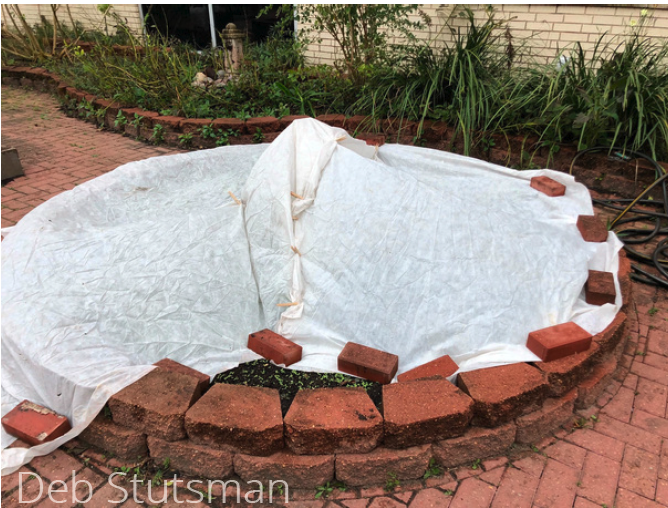 |
||
|
|
|
|
||
|
Tender Tropicals Covering during prolonged freezes will not protect. Extra mulch insulates roots from cold weather. |
Native Plants Native plants have evolved with our region. They are more likely to survive from freeze and frosts. |
Vegetables & Herbs Cool season veggies vary with hardiness, but root crops will have the extra protection of soil, if it doesn't freeze. |
||
 |
 |
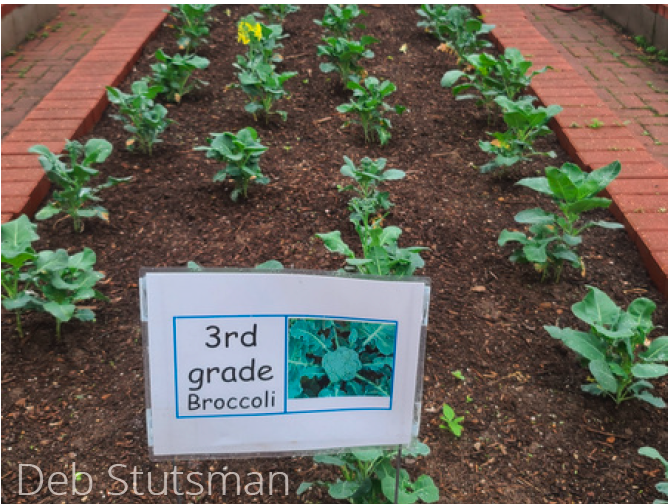 |
- If you lose power during a winter storm, remember to NEVER use your generator, grill, camp stove or similar devices indoors. Always follow the manufacturer’s guidelines.
- A gas stove or oven should NEVER be used to heat your home either, as this increases your chance of carbon monoxide poisoning.
- Protect yourself from carbon monoxide (CO) poisoning by installing a battery-operated CO detector and ensure that your existing smoke detectors have fresh, working batteries.
- Place space heaters on solid, flat surfaces, and make sure they have an automatic shut-off in the event that they tip over.
- Keep children and anything that can burn at least 3 feet away from all heating equipment.
Stay informed! Monitor the local forecast at www.weather.gov/hgx. Sign up to receive Harris County emergency alerts at www.ReadyHarris.org and follow ReadyHarris on social media.
By Tiffany Krenek, My Neighborhood News ![]()
 |
Tiffany Krenek has been on the My Neighborhood News team since August 2021. She is passionate about curating and sharing content that enriches the lives of our readers in a personal, meaningful way. A loving mother and wife, Tiffany and her family live in the West Houston/Cypress region. |


